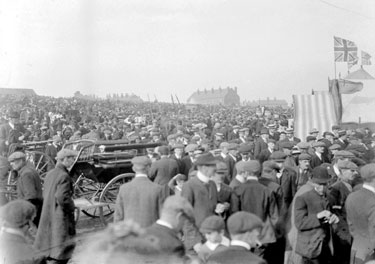Student sound walk exploring Huddersfield’s march to war

My name is Adam West and this is my second blog as a second year history undergraduate at the University of Huddersfield where I have been undertaking a module looking at making history more accessible to the Huddersfield public. This module, called Hand’s on History, was taught by Dr Janette Martin and during the course of the year, in groups, we were to design an exhibition board and make a sound walk, both centred on historic themes in Huddersfield. I have written a blog on the exhibition board, which was called Combat, Khaki and the Colne Valley, which was based on a conscientious objector in the First World War. For the sound walk, my team consisting of Martyn Richardson, Amy Austin and I decided to use Martyn’s idea of World War I and the march to war as a terrific sound walk, which went alongside the centenary of the start of the war this year.
Recruitment in Huddersfield was similar to most working class towns; the soldiers were mixed in their moods as was the crowd, as many had been expecting war, (not in mainland Europe, but rather in Ireland). The soldiers in Huddersfield were part of the West Riding Duke of Wellington Regiment and on the 5th August 1914, with the outbreak of war, 450 men and officers marched down New Street and into St Georges Square to begin their journey to war. Most were sent to guard water towers and power stations in Lincolnshire and were to arrive in France at a later date.
Our sound walk consisted of contextually setting the scene of Huddersfield in August 1914 when people awoke to a war-time Britain. Standing outside the Town Hall, listeners are guided through the soldiers feelings as they march down New Street and John Williams Street towards the train station. The narrative takes the listener on a detour to the Market Place where recruitment would begin when the attrition rate at the front began to rise.
After the listener ‘re-joins’ the soldiers at the train station they are immersed into the feelings and thoughts of an anonymous soldier from Huddersfield and his diary extracts and letters home. All the extracts were compiled from online sources and letters found in the West Yorkshire Archive Service in Huddersfield. Beautifully read out by Martyn, the listener experiences the devastation of war as the letters slowly begin to descend into writing of pain and suffering. Towards the end of the sound walk, a two-way alternative ending was scripted at the Market Cross in the town centre where the listener reaches a certain point, a gas attack on the front, and they are not sure whether the person survives or dies.
This highly emotive end tries to distinguish how close every soldier was to death and tries to paint a picture of the sacrifice made from the 4500 soldiers that died on the Front from Huddersfield.
This sound walk attempts to show and reveal the emotion that would have been evident at the onset of war in Huddersfield in 1914 and the experiences the soldiers on the frontline went through by the reading out of their thoughts through mock letters. The research on gathering information from the Huddersfield Examiner and WWI letters shows the authenticity of our sound walk and attempts to put the listener there in 1914. We were also fortunate to get to talk to John Rumsby and Cyril Pearce of the Huddersfield Local History Society, who were both able to give us helpful information in formulating our script for the sound walk.
As well as using a piece of classical music as backing music for the sound walk, we ended on the Last Post as an attempt to leave no eye dry and hopefully engage with the listener to remember the lives of those who died.
Adam West
If you would like to hear the sound walk please get in touch with Janette Martinj.martin@hud.ac.uk
History at Huddersfield uses research-led teaching and a commitment to public engagement to ensure that what we do is both useful to society and beneficial to the employability of our students. We see our students as researchers – partners in the development of knowledge with academic staff, often through co-production of knowledge with community partners. For more information see http://www.hud.ac.uk/courses/full-time/undergraduate/history-ba-hons/ and http://www.hud.ac.uk/research/history/
You can email us at historyadmissions@hud.ac.uk